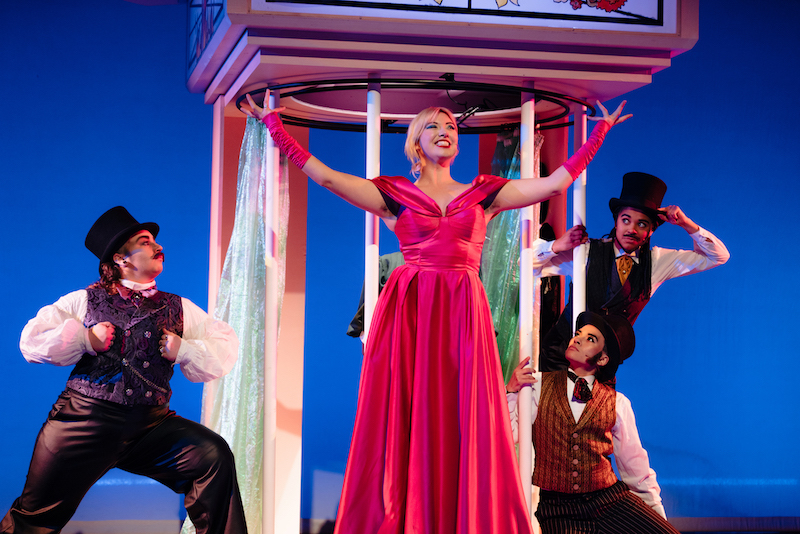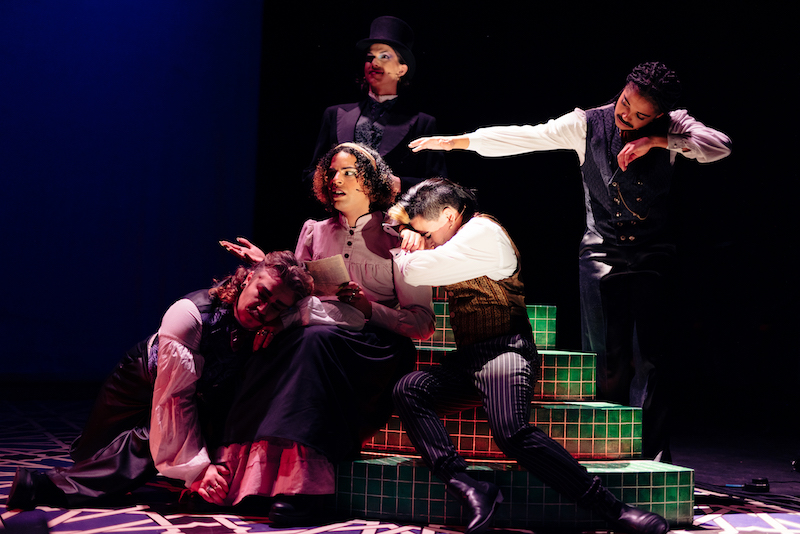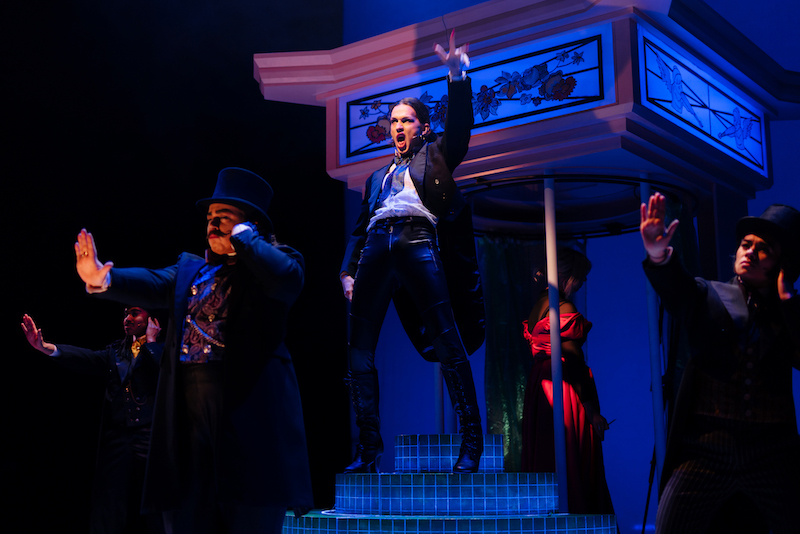Hull writer, performer and poet Michelle Dee responds to seeing Modest at Hull Truck Theatre this week.
Michelle was invited to host our post-show discussion and kindly shared her thoughts with us after seeing the performance not just once, but twice!

CW: the following may contain moments of unbridled joy, effusive praise and “Oh my God, I feel seen…”
During the Q&A at Modest on Wednesday night, we discovered through assistant director Prime Isaac that the team saw over 2,000 queer performers, before settling on the present cast. And I, as the invited chair of the post-show panel, said: “Over 2,000 queer performers? I thought I was the only one.” An off-the-cuff remark, but one that goes to the heart of the isolation that trans people can experience throughout their lives.
When Emer Dineen, who plays Elizabeth, breaks into the ovation during the curtain call and says “support your trans siblings”, it feels like a torchlight or a touchstone in theatre-making in Hull. Five years ago as dancers in Gary Clarke’s Into the Light, we issued a rallying cry to the throng during LGBT50: “We’re here, we’re queer, we’re showing no fear!” Tonight, with heart similarly busting and a glowing, feels like another breakthrough.
Modest, a queer drag king cabaret, co-directed by Paul Smith of Middle Child and Luke Skilbeck of Milk Presents, feels radical and relevant to what is happening today. At its heart is the story of the real-life Victorian artist Miss Elizabeth Thompson, later Lady Butler, evocatively described as, “the baddest, bitchin’ babe of art” and her fight in 1879 London, to be accepted into the Royal Academy.
Elizabeth is a woman at the top of her game, not being given the recognition she deserves; a woman reluctantly becoming inspiration and trailblazer; a woman trying to break down patriarchal barriers; a woman trying to be seen and heard when men rule the roost and crow about it. Where have we heard that before? Answer. Almost every activity, industry, creative pursuit that ever there has been, from the arts to the sciences and everything else, ever.
The show’s title Modest refers to a particular trait that Elizabeth does not display. The aforementioned baddest babe of art is anything but modest. However, she knows to play it demure when occasion demands. Trained in the classic style of the Florentine school, she also knows she is a damn good artist. Furthermore, she has captured the public’s imagination and the attention of the press, even royalty. Now the top hats at the Royal Academy are spitting feathers and champagne down their waistcoats.

Let us remind ourselves that Elizabeth comes from a family of privilege. If she had been a working class woman these kind of opportunities would not have been within her grasp. As it is, through hard work and undoubtable talent and skill, she is destined to become a very fine painter. Setting herself yet further apart from the rest is her subject matter.
It is not enough for her to be a woman artist; Elizabeth is a war artist. And not enough is it to be a war artist, no. She eschews the charger riding heroism, for deeply moving depictions of humanity, painting the abject futility of war. So much radicalism, so much to admire in one woman. Was Elizabeth really like that? It doesn’t matter. The Elizabeth created by Modest writer Ellen Brammar is this and much more besides.
This Elizabeth is unapologetically arrogant. She is bloody good and she knows it, and what’s more, she knows that everybody else knows it too. Talent runs in the family. Her sister Alice Meynell is an eminent essayist and poet, and in a curious echo of her sister, will twice be turned down for poet laureate during her lifetime. And have we heard of Alice or Elizabeth before? Not likely, because history is written by the victors.
I said this play was radical and relevant and it is. Casting Alice as transgender, brilliantly played by Fizz Sinclair, is a stroke of genius. Her activism and desire for her sister to be that trailblazer; to raise the rest of the sisterhood; to be a figurehead of emancipation, just because she has one foot in the door at the Royal Academy, opens up all manner of debates.
Namely, an artist’s role is always to use their talent to better the lives of others. Two, a minority owes it to the world to be a spokesperson and role model for their people. Three, an artist should use their art to talk about the important issues of the day. I could go on.
Elizabeth is doing some of that. Her paintings pricked the ridiculous pomposity of the upper classes, shone a bright light in the face of the patriotic fervour found in canvases where boy soldiers prance about on horseback on foreign soils, getting enlisted men killed by the thousands, in foolhardy skirmishes.
Then there is Bessie, an aspiring young artist played with great affection by Libra Teejay – who, if asked, would certainly describe themselves as Elizabeth’s biggest fan – who also just happens to be non-binary. The way they describe how they see themselves just touches my heart. So that’s at least two gender queer characters, in one play, on one stage, from opposite ends of the social ladder, doing, saying and feeling different things at different times, who are not in any way tragic, and don’t get murdered. I’d say that is pretty damn radical.

During the interval I said to the woman in front of me: “The men appear to be having more fun.” She nodded, remarking: “Isn’t that always the way?” The men, to whom I am referring, are the RAs. The Royal Academicians (so not easy to say) who view the Royal Academy of Art as their own personal fiefdom, wielding their power and privilege and delighting in petty gamesmanship at every turn.
These wily mutton-chopped heads of the table – stuffed shirts so bloated with superiority and supercilious air – are deliciously portrayed and undercut by a hatful of leading names in drag king-dom. The RAs are a riot. Every moment they are on stage there is an extra frisson of queer joy in the room.
All this and I’ve not mentioned the understated set, featuring a central column, designed by QianEr Jin; the subtle lighting by Jessie Addinall, or the fabulous outfits designed by Terry Herfield and Sian Thomas: if you are a fan of tight black leather you will be in seventh heaven. And then there’s the music: it is cabaret theatre after all.
The variety of songs in Modest and musical styles including queer pop, music hall and electronica, have been composed by Rachel Barnes. The titular song Modest is an absolute tour de force, and I for one can’t wait to be swept away by Emer’s soaring vocals once again. Bossy Women, a duet between Alice and Elizabeth is something of a feminist anthem; then there’s the torch song number Goodbye, Miss Thompson, sung in heartbreaking fashion by Bessie, now wearing their best dress.
Modest: A blink and you’ll miss it abundantly queer cabaret, that uses a historical framework to ask pertinent questions while subverting gender roles, introducing delicious stage presence and drag king swagger, and damn fine performances throughout.
Michelle Dee is a writer, performer and poet. She is co-producer of Women of Words Hull, with commissioned works for BBC Contains Strong Language, Yorkshire Dance and Apples and Snakes, often found prancing around on stage for the cabaret Sideshow Wonderland.
